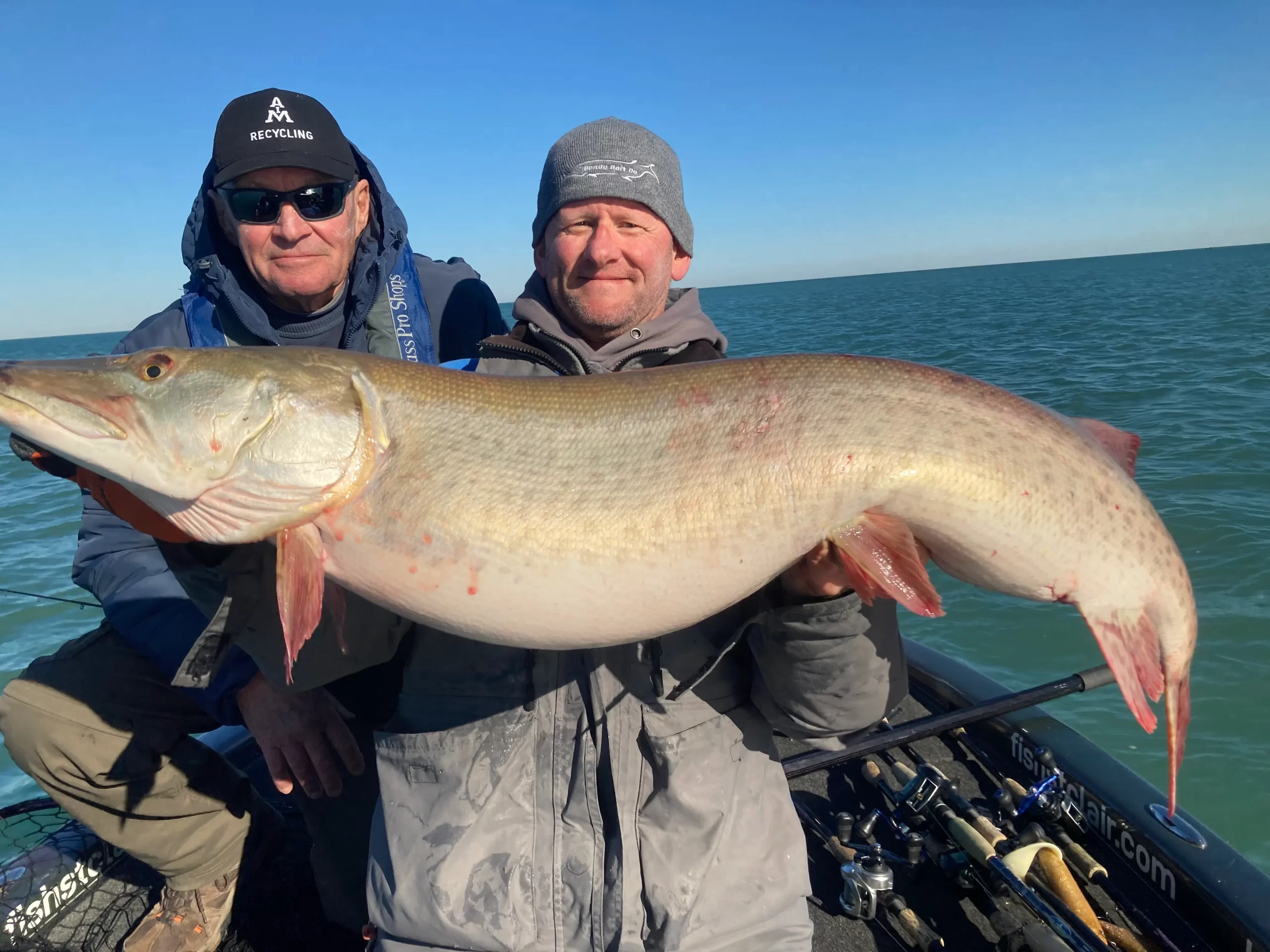Lake St. Clair Muskies with Jon Bondy

* This page contains affiliate links. The Great Lakes Fisherman may earn a commission on items purchased through these links. For more on this, please click here.
Muskies are one of the toughest freshwater fish to catch. In fact, list after list, published by many popular internet sources (guidesly.com, insidehook.com, & wideopenspaces.com to name a few), consider muskies to be one of the toughest fish to catch in the world. And if you’ve ever tried to catch one, you probably agree.
Why Musky are Hard to Catch
There are several main reasons why muskies can be so difficult to catch. Being among the largest freshwater predator fish in the world, their population density is among the lowest. This means that with no knowledge of where they hang out, the odds of a musky seeing your bait is extremely low.
Of course once they do see your bait, they need to believe it’s prey and that is another challenge in and of itself. Although the fish can be very aggressive at times, there are right ways to present a bait that will significantly increase your odds of getting bit.
And even when you do finally get a musky to bite, the physical battle begins and you have to get it in the boat. This is another challenge entirely. These fish have large, sharp teeth and their head shakes can span 8 feet or more. They can, and often will, jump out of the water entirely in an effort to throw the bait. This means preparation and having the right tackle plays a large role in your success.
Lake St. Clair’s Musky Fishery
Lake St. Clair is a top musky fishery on just about every musky angler’s list. In fact, some would consider it the best they have ever fished. The lake has an average depth of 11 feet, but can get as deep as 30’+ in the shipping channel which connects the St. Clair River delta to the mouth the Detroit River.
Outside of the shipping channel are large undulating “flats” that vary in both depth and weed cover. These weed beds are home to a whole slew of fry and baitfish and there is almost no place in the lake where you won’t mark fish. It is truly a fish sanctuary.
Methods for Catching Lake St. Clair Muskies
There are 3 popular methods of fishing for musky on Lake St. Clair: trolling, casting and jigging.
Trolling is probably the most popular method for catching muskies and is the most recommended for folks that are new to the lake. This method involves the use of large body baits and bucktails trolled at a fast speed (3-5 mph) over areas that hold muskies. At these speeds, this method allows you to cover a lot of water, making it very effective for those less familiar with the lake. (Note that weed management can be a challenge and having a rig that keeps weeds off of the lure is important).
Casting bucktails is another popular method here. If you are more familiar with the lake and have the stamina, seeing a fish follow your bait to the boat can be exhilarating. In order to make this method payoff, it helps to have some familiarity with the lake so that you are working areas that you know will hold musky. This method involves a lot of physical effort and is not for the faint of heart.
A third method that has grown in popularity in recent years is jigging for musky. This method involves using a jig that is specifically made for muskies and working it along areas that are known to hold them. This method can also be physically demanding but has become one of the most exciting ways to hook big fish. (See video link below for more on jigging for muskies).
Q&A with Jon Bondy
To learn more about musky in Lake St. Clair, The Great Lakes Fisherman caught up with Jon Bondy. Jon is well known both locally and nationally as both a guide and as the owner of the Bondy Bait Company, Inc.

GLF: How did you get into the sport of musky fishing?
I grew up fishing for everything that swims. From gar and carp to musky. Musky always seemed like something that I hoped to go out and catch but considered them rare as a kid. As I grew older my interest in them grew as well.
GLF: How long have you been fishing for muskies on Lake St. Clair?
I started targeting musky probably in the late 80’s when I got a small boat and actually made my first musky lure back then. It was a fluorescent orange jerk bait I made out of a piece of a hockey stick.
GLF: How long have you been a musky guide?
I’ve been a multi species guide for 29 years. The first 4 or 5 years I guided only for bass and walleye but people kept requesting that I take them out to cast for musky so I added that about 25 years ago.
GLF: Muskies are said to be the fish of 10,000 casts. Would say that number holds true on LSC?
If that were a true ratio I think we would have all quit years ago! I do a lot of jigging and average 20 to 22 hops per minute. With 2-3 anglers jigging together we average 3-4 musky a day landed. But a lot of that depends on the customers’ ability to get them hooked properly.
GLF: Do the muskies on LSC seem to have a preferred forage prey?
I think their preferred prey is gizzard shad. The lake is full of them, but they’ll eat anything in front of them. I have had them eat my smallmouth bass I was reeling in at least twenty times.
GLF: The Great Lakes have undergone significant environmental changes over the last couple of decades, especially in terms of water clarity. Have you noticed any trends in musky catch rates that seem to correlate with these changes?
As with all sight feeding predators, the fish have gotten more numerous and bigger. Of course the prevalence of catch and release may have played a huge roll in these numbers. There are more weeds for the fry to hide in now too so that could result in more fish in the system reaching maturity.
GLF: Which method for catching musky do you find to be the most exciting?
Jigging is my favorite. Getting a bite directly under you using braided line that has no give is the closest thing in fresh water you can find to shark fishing. Unlike casting where you can often see the fish following the lure, the bites you get when jigging are violent and can happen at any time. Usually it surprises my clients when it happens. You just have to be ready.
GLF: In your experience, which method produces the highest numbers of fish?
Most people would say trolling but If you take the number of lines in the water and man hours I’d put jigging up against anything. It just takes a lot of work to do it all day.
GLF: Which method produces the largest fish?
Almost all of my biggest and fattest fish come jigging so I’m a little biased towards that. But it could be the type of fishery I’m on.
GLF: What type of structure, depth, etc. do you look for when targeting musky on LSC?
In mid summer I’m out on St. Clair casting in the open water. In this case I’m looking for subtle bottom changes. From clay to sand etc or weedy areas where there seems to be a lot of life overall. Often the areas full of fish will have sturgeon feeding in the area.
GLF: What is your personal record for the most muskies landed in a day?
That would be 19. I’ve had plenty of 12-15 fish days but they are rare.
GLF: When does your season for guided musky trips start and how long does it run?
Starts the first Saturday in June and goes to December 15 if the ice doesn’t lock us up before then.
GLF: Do you guide for anything besides musky?
Bass and walleye primarily but can target anything that swims.
GLF: Where can people go to learn more about your business or to book a trip with you?
GLF: If you had to recommend just one bait style and color combo from your line of musky baits, what would it be?
A pearl Bondy Original is the one bait every angler should have.
GLF: Is there anything else you would want readers to know about musky fishing in Lake St. Clair?
Be prepared to catch one, by having the proper tools, net and puncture proof gloves. Long needle nose and hook cutters are a must. Get the fish back in the water as soon as possible, especially in the summer time when they are stressed out.
Releasing Musky
Jon’s last answer above warrants some additional discussion on the release of musky. With musky on Lake St. Clair being a catch and release fishery, it cannot be over-stated how important it is to release the fish properly. Getting the fish back to the water as quickly as possible is voital to their survival. Unlike small fish, large fish don’t handle lack of oxygen very well. For more on releasing muskies the right way, check out this article by Midwest Outdoors.
The Great Lakes Fisherman appreciates Jon taking the time to answer some of our questions and helping shed some light on the various aspects of musky fishing on Lake St. Clair. If you enjoyed this article, or if you have topics that you would like to see covered on The Great Lakes Fisherman, feel free to drop us a comment below.

))/4657592.json)
))/1729010.json)